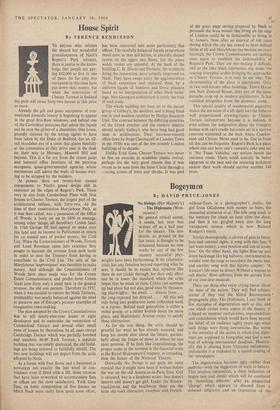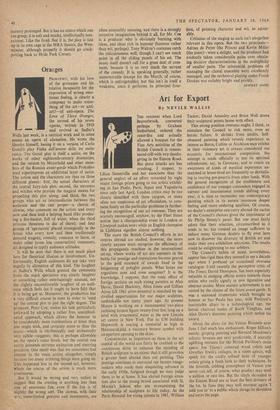Bogeymen
By DAVID PRYCE-JONES No Strings. (Her Majesty's.) —The Diplomats. (West- minster.) BY general critical assent, it seems, last year was written off as a bad year for the theatre. The new drama, so praised in the last years, is thought to be exhausted because no new works by any of the few recently successful play- wrights have been forthcoming. If the columnist- critic has any function beyond reporting what he sees, it should be to ensure that opinions like these do not trickle through, for their only effect can be W lower the standard which the critic hopes that he exists to raise. Critics can summon up bad plays but not alas, good ones by threaten- ing playwrights: 'we await . . . silence from . . . the long-expected but delayed. . . All this will only bring into production some unfinished work as a riposte. Behind such generalities is either a veiled gossip, or a rather brutish desire for more plays, and Shaftesbury Avenue exists to satisfy these alternatives.
As for the real thing, the critic should be grateful for what he has already received, and keep his mouth shut about the future, particu- larly about the future of those in whom he sees most promise. If he feels like inquisitioning, the proper cause at the moment is the financial crisis at the Royal Shakespeare' Company, or crusading, then the future of the National Theatre.
Outwardly No Strings is not quite the same musical that it might have been if written before the war on the old American-in-Paris lines. Girl is coloured, boy is a layabout writer; boy doesn't deserve and doesn't get girl. Under the Sinatra- mackintosh and the beachwear these are the same old stock characters, complete with French- , without-Tears in a photographer's studio, the girl from Oklahoma with money to burn, the monocled aristocrat et al. The title song stuck in the memory for about an hour after the show, and then it too gurgled away into the long transparent stream which is now Richard Rodgers's music.
Trivial choreography, a chorus of girls in funny hats and oatmeal tights, a song with this line, 'I just want money, a nice position and lots of lovely love.' On the other hand, the lights float up and down backstage like big balloons, instrumentalists wander over the stage to introduce the music line, and another song with this bizarre couplet : 'A woman's life must be dreary Without a woman to call dearie.' How different from the private lives of our own dear musicals.
There are those who enjoy crying havoc about the state of the nation. They will find subject- matter if they visit the Moral Rearmament propaganda play, The Diplomats. 1 can think of few examples of degeneration such as this, and one which covers every aspect of the theatre. It is based on 'surprise' curtain-lines, improbabilities and coincidences which would have been beyond the belief of an audience eighty years ago when such things were dying conventions. But worse is the unreality of the action in which four diplo- mats are supposed to foregather and find a new way of solving international deadlock. Theatric- ally this is aborted from Victorian melodrama; realistically it is exploded by a casual reading of the newspapers.
The degeneration becomes ugly—rather than pathetic—with the suggestion of ways to behave. This involves innuendoes, a slimy indication of bogies (sex and drink) which will be combated by 'something different' after an unspecified 'change' which appears to descend from a debased religiosity and an impression of the nursery prolonged. But it has no centre which one can grasp; it is soft and mushy, intellectually non- existent. Like the freak that it is, the play is tied up in its own cage at the MRA theatre, the West- minster, although properly it should go crack- potting back to Hyde Park Corner.



































 Previous page
Previous page